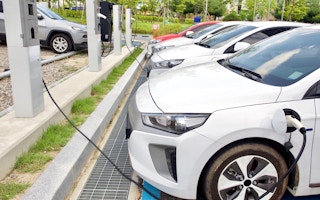Electric cars are intended to help mitigate the climate impacts of the transportation sector, which is responsible for about 15 per cent of global greenhouse gas emissions. But since electric vehicles, in most cases, are powered by an energy grid still reliant to some degree on fossil fuels, there are concerns that they may not actually deliver the expected benefits for the climate.
New research, however, shows that those concerns are unwarranted in almost all parts of the world.
A team led by researchers at the Netherlands’ Radboud University looked at the emissions of electric versus petrol-fueled vehicles and found that driving an electric car produces lower overall emissions in about 95 per cent of the world.
In countries like Sweden and France, where electricity is generated mostly through nuclear and renewable energy sources, average lifetime emissions from electric cars are as much as 70 per cent lower than gas-powered cars. It’s only in a few places where electricity generation is still heavily dependent on coal, such as Poland, that electric cars do not confer any climate benefits, the researchers found.
The researchers also examined electric household heat pumps and determined that they produce lower emissions than fossil-fueled alternatives across 95 per cent of the globe, as well. The results of the study are detailed in a paper published in the journal Nature Sustainability this week.
According to Florian Knobloch of Radboud University, the lead author of the study, “the idea that electric vehicles or electric heat pumps could increase emissions is essentially a myth.”
He added: “Here is a definitive study that can dispel those myths. We have run the numbers for all around the world, looking at a whole range of cars and heating systems. Even in our worst-case scenario, there would be a reduction in emissions in almost all cases. This insight should be very useful for policy-makers.”
Taking into account differences in fuel types and technologies used for electricity generation, Knobloch and team divided the world into 59 regions, then calculated the greenhouse gas emissions generated in each region not only when cars and heating systems are used but also throughout the production process and waste processing.
They found that electric cars and heat pumps are already less emissions-intensive than fossil-fueled alternatives in 53 of those regions, including all of Europe, the United States, and China.
“Taking into account emissions from manufacturing and ongoing energy use, it’s clear that we should encourage the switch to electric cars and household heat pumps without any regrets,” Knobloch said in a statement.
By 2050, half of all cars on the streets could be electric, the study projects. That would reduce global carbon emissions by as much as 1.5 gigatons, the amount of CO2 emissions the entire country of Russia is responsible for, every year.
Electric heat pumps could reduce global CO2 emissions by 0.8 gigatonnes per year, which is roughly equivalent to the amount of emissions Germany is responsible for annually.
The researchers say their findings have already caught the attention of policymakers.
“We started this work a few years ago, and policy-makers in the UK and abroad have shown a lot of interest in the results,” Jean-Francois Mercure of the University of Exeter, a co-author of the study, said in a statement. “The answer is clear: to reduce carbon emissions, we should choose electric cars and household heat pumps over fossil-fuel alternatives.”
This story was published with permission from Mongabay.com.

















